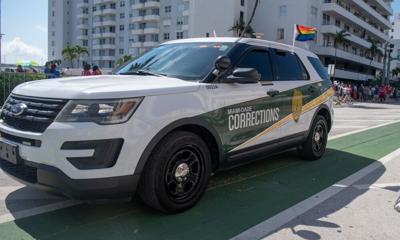
MIAMI – A former Miami-Dade correctional officer alleges in a federal lawsuit he was discriminated against and wrongly relieved of his duties by the department.
Plaintiff Enrique Caballero filed his lawsuit July 3 in the U.S. District Court for the Southern District of Florida, Miami Division. The lawsuit names Miami-Dade County on behalf of the Miami-Dade Corrections and Rehabilitation Department as the defendant.
Caballero began his employment with the county and CRD as a correctional officer, or CO1, in October 2016.
In his 11-page filing, he alleges the county violated the Civil Rights Act of 1964. The Civil Rights Act is a federal law that prohibits discrimination based on race, color, religion, sex, or national origin.
Issues began when, in 2020, Caballero was placed on a two-year restricted duty after an alleged unlawful use-of-force incident that occurred at the Miami-Dade County Pretrial Detention Center.
During the 2019 incident, Caballero was called to back-up a two-person team of correctional officers who were attempting to subdue a Black male inmate.
After a change of leadership in the Mayor’s Office in 2020, Caballero claims he reached out to the Internal Affairs Office. He discovered CRD did not have a restricted duty on file for the 2019 incident, and he was subsequently cleared.
But then, in July 2023, Caballero was accused of sleeping on the job by Detention Facilities Division Chief Robert Brown. Brown believed Caballero was sleeping in an employee lounge; Caballero claims Brown startled him while he was listening to a podcast through headphones.
In November or December 2023, because of Brown’s assertion, Caballero was placed on restricted duty for sleeping-on-duty.
On July 23, 2024, Caballero was called to CRD headquarters in Doral, Fla., for a final presentation on the sleeping-on-duty charge. Caballero was informed that CRD assessed a 10-day suspension.
Caballero claims he requested the suspension to start after the beginning of August 2024 so he could compile additional work hours.
“Despite other employees being provided such an accommodation, Caballero's request was denied,” he wrote in his complaint.
Caballero said he proceeded to go to CRD Director Marydell Guevara’s office, seeking a modification from the office so he could work leading up to the start of his suspension.
Upon his arrival, Supervisor Alisea Jenkins informed Caballero that his appointment was over and he needed to proceed downstairs. But Caballero said he persisted, asking for Jenkins’ supervisor.
“Jenkins replied that she was the supervisor,” the complaint states. “Caballero again asked Jenkins to speak with a person with a position over her. Jenkins stated that she was giving Caballero a direct order to walk downstairs.
“Caballero observed an assistant director, who Caballero knew professionally, sitting in a nearby office and knocked on the door. However, before Caballero could talk to the assistant director, Jenkins struck Caballero with her shoulder and said, ‘excuse me.’ The assistant director did not respond.”
Caballero said he contacted the Doral Police Department; an officer arrived at the scene and conducted an inquiry.
According to the filing, Jenkins denied committing battery and Caballero was escorted to the lobby.
On July 28, 2024, Internal Affairs informed Caballero he was relieved from duty based on the July 23, 2024 headquarters incident.
Caballero claims he has yet to receive a formal report on the incident or be placed back on duty.
“As a result, Miami-Dade has constructively discharged Caballero,” the complaint states.
Constructive discharge essentially is an employer-created situation that forces an employee out.
“Miami-Dade engaged in racial and color discrimination against Caballero based on disparate treatment under Title VII,” the complaint states, noting that Caballero is Latino and well-qualified to perform the duties of correctional officer with the county.
Caballero argues he was subjected to adverse employment action, meaning he suffered a significant negative change in his job status or working conditions.
He also contends the county treated similarly-situated employees in other racial and color groups “more favorably.”
“Specifically, Miami-Dade elected not to suspend the employment of two Black American correctional officers who engaged in a physical altercation stemming from jealousy from the men's romantic involvement with a female CRD employee,” he pointed out in his filing.
He also argues there’s a connection between his protected activities and the adverse employment action.
“In particular, the relief of duty action occurred five days after Caballero: (a) attempted to communicate, or seek a modification of, his 10-day suspension to the CRD Director; and (b) filed a report of Jenkins' battery to the Doral Police Department,” the complaint states.
Caballero filed a charge of discrimination with the U.S. Equal Employment Opportunity Commission, or EEOC, on March 29, 2025. On April 4, the commission issued a Determination of Charge and Notice of Your Right to Sue.
Caballero seeks a judgment declaring the county’s actions unlawful and enjoining the county from engaging in such acts; an award of damages; back pay and front pay; reinstatement of “full fringe benefits” and seniority rights; compensation for lost wages and benefits; and attorneys’ fees and legal costs.
He is represented by Buckner Legal Self-Help Program Inc. in Coral Springs, Fla.






